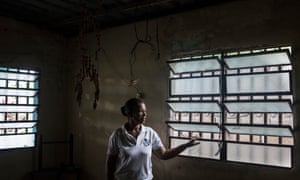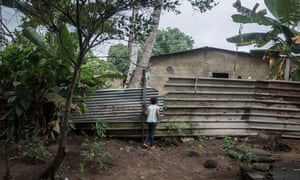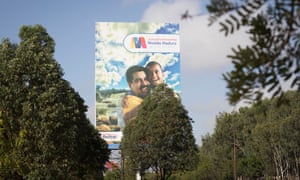 |
| Nicolás Maduro |
Venezuela: children of the crisis
A million children left behind as Venezuela crisis tears families apart
As the country battles economic collapse, parents have been forced to migrate, leaving their offspring in the care of family, neighbours or sometimes alone
by Tom Phillips and Clavel Rangel in Ciudad Guayana
Thu 20 February 2020
It has been four months since Isabel Carrasco skipped her crumbling country, entrusting her daughters to a neighbour to join modern South America’s largest ever exodus.
Carrasco’s destination was Guyana, although the woman now raising her children isn’t sure which part.
“They always cry when they talk to their mum on the phone. They say: ‘Mummy, come back … Mummy, we want to see you!’ It breaks my soul,” said Juana López, 58, a longtime family friend, who Carrasco’s daughters now call “Mami”.
Camila and Darianyelis, aged nine and seven, are among nearly one million “left-behind” Venezuelan children whose parents have been forced to migrate, leaving their offspring in the care of grandparents, aunts, siblings, neighbours or sometimes even completely alone.
López now raises the two sisters at her home in Brisas del Sur, a shabby, hard-knock suburb of Ciudad Guayana, and is battling to provide a happy and stable childhood.
Their bedroom’s pink walls are plastered with Hello Kitty posters and Bible quotations. “Keep me as the apple of your eye. Hide me in the shadow of your wings,” reads one.
In the backyard, Camila and Darianyelis have built a fantasy kitchen from scrap metal and cinder blocks, where they use disposable cutlery to feed eggshells to their dolls.
But psychologists say the emotional scars run deep for Venezuela’s left-behind children.
“When you peel back all the skin on the onion, you realize these children are wounded,” said Jannia Orta, a psychologist from Cecodap, a Caracas-based NGO that offers them free support.
Orta said such children often struggled to put their feelings into words. But their anguish was unmistakable in drawings where they depicted themselves as tiny, almost irrelevant figures on huge blank sheets of paper, or covered the page in angry scribbles.
“There are children who interpret this migration as an abandonment. They feel alone. They feel they have nobody – and this has an undeniable impact on their self-esteem,” Orta said.
Ivonne Serrano Rodríguez, who runs a shelter for abandoned infants in Ciudad Guayana, said such children needed reassuring they were not being left behind for any fault of their own.
“They don’t understand why they’re being brought here … They ask: ‘What did I do?’ We tell them they aren’t to blame for anything,” said Serrano, whose adoptive daughter, Keren, was abandoned at birth by a mother apparently too impoverished to care for her.
Not all left-behind children have parents outside the country.
In the eastern state of Bolívar, many are joining a 21st-century gold rush that has helped Nicolás Maduro’s authoritarian regime survive collapsing oil revenues and US sanctions.
“My mum’s in the mines,” said Elvis, a broken-toothed 12-year-old who sleeps on Ciudad Guayana’s streets and said he had not attended school in two years.
Elvis’s 11-year-old friend, Richaldy – with whom he sleeps in a rubbish-strewn alley behind a fast-food restaurant – said it had been three months since his mother left.
Richaldy believed she was near El Callao, a goldmining hub now considered one of Venezuela’s most violent towns. But when might she return? Richaldy shook his head vaguely before returning to the streets to beg.
Some children have been inadvertently robbed of their parents.
When 29-year-old Ysabel Abad Rojas set off for the Colombian border last October she envisaged only a short trip.
Penniless and desperate, she was recruited as a drug mule and tasked with smuggling a cargo of cocaine through Venezuela and on to northern Brazil.
But Abad was arrested trying to re-enter her country and now faces a lengthy jail term in Colombia.
“She called and said she was facing eight to 15 [years],” said her mother, Damelis Del Valle Rojas Abad, who is now raising her daughter’s three children, Santiago, Kamila and Yonnielys, ages 11, three and one.
Who did Rojas blame for her family’s disintegration?
“It’s survival. It’s necessity. It’s this president of ours,” the 59-year-old replied as she showed off the small allotment she now relies on to feed her grandchildren.
Everywhere in Rojas’s gloomy shack were reminders of the difficulties that had pushed her daughter into the arms of drug smugglers, and jail.
A disposable diaper – scrubbed clean for the umpeenth time – hung from a barbed-wire washing line in the porch. Nearby, a hand-written 2020 calendar had been taped to the wall.
“We couldn’t afford to buy one – so we invented one,” Rojas said with a smile.
For the already struggling families caring for Venezuela’s left-behind youth, such improvisation is a constant theme.
Juana López said she scraped by thanks to the charity of a local priest and working the occasional shift in the kitchen of a local school – when the government provided food that could be cooked.
For that she received 180,000 bolívares per fortnight (about $2.50), enough to buy little more than a single bag of rice.
López, the daughter of a coffee picker who started work at the age of 12, is no stranger to hardship. But even for her Venezuela’s current crisis was of a different order.
“For me this is the worst moment in my whole life,” she admitted.
On the day the Guardian visited, she, Camila and Darianyelis had eaten only one portion of arepa (corn flour cakes) with cassava.
“Ask me what we ate with it?” López chuckled darkly, before answering her own question: “Absolutely nothing!”
For all the privations, López said sheltering her neighbour’s daughters was her duty and her pleasure.
“I love her like she was my own daughter,” she said of their absent mother whose return she could not predict. “And I love these girls, too.”





No comments:
Post a Comment